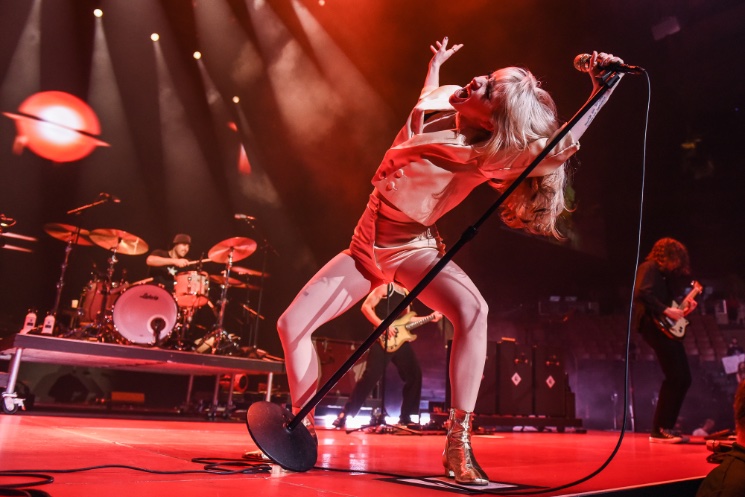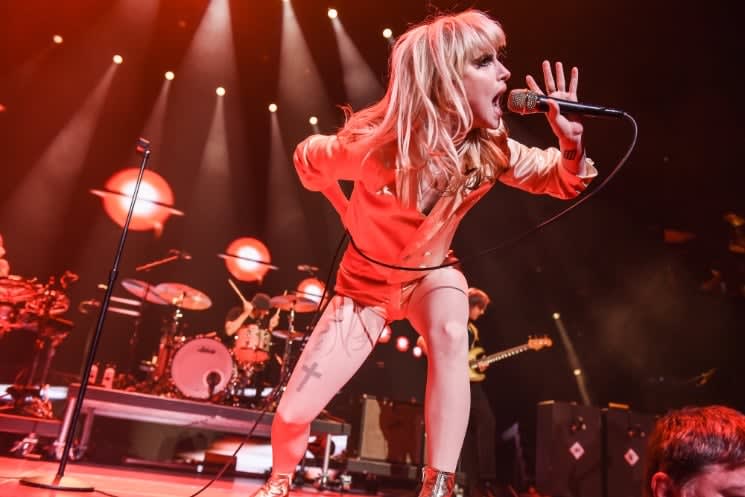The world is on fire, and Paramore are a band. This was the state of the union agreed upon going into Scotiabank Arena last night, collectively trading the thick murk of Quebec wildfire smoke for fog machines.
The first line Hayley Williams sang rang through the stadium like a ripcord with even more sardonicism than she had initially written it with: "Living well is not my kind of revenge."
We were warned about pyrotechnics for that opening song, "You First" (see what they did there?) from Williams, guitarist Taylor York and drummer Zac Farro's most recent album, This Is Why, but it was just confetti. The real fireworks display came shortly thereafter with beloved Riot! cut "That's What You Get," which has the power to instantly revert you to being an angsty 12-year-old with its opening riff and pitter-patter percussive attack alone. It's a pounding in my chest, unwavering since the sixth grade. As giddy now as ever.

"STOP FUCKING THE PLANET," Williams's shirt read once she'd removed her shiny gold blazer to reveal a design that wouldn't have been out of place on a Stitches mannequin at your local mall in the early 2010s. Which is kind of perfect, considering how long Paramore have had their teeth in the generations of teens that have meandered through there with their friends, food court Iced Capps in hand.
"It's so good to just cross that border sometimes," Williams laughed as she expressed her gratitude to be back in Toronto, welcoming a break from the anti-LGBTQIA+ legislation passed in her home state of Tennessee, of which she's been an outspoken critic.
However, she promised us one thing: "We are going to shut out the bullshit that's out there," the frontwoman instructed, setting the intention for "this sacred evening that we're sharing together."
But of course, the twist is that the bullshit is what makes it sacred. As they've moved through their career, Paramore have become more and more entangled in their context; despite hoping to provide a reprieve from the literal hellfire outside, they're not interested in being a Warped Tour nostalgia act.

This was evident through how heavily the setlist leaned on their later-career music, drawing predominantly from This Is Why and 2017's new-wavey After Laughter. That being said, I found myself gasping in delighted surprise multiple times in moments when I realized what song they were playing: "Turn It Off," my favourite track from 2009's Brand New Eyes — a CD I wrecked from playing over and over; Paramore (2013) deep cut "Last Hope"; "Decode" from the Twilight soundtrack; "Crystal Clear'' from Williams's debut solo album, Petals for Armor.
Lead singers tend to become the face of most bands, and that's especially true when they're fronted by non-dudes. This is something Williams has long resisted, emphasizing that Paramore is a band at any given chance — yet it's ever understandable to see why she casts a spell on audiences with her magnetic pull on stage. She mentioned being a little hoarse from the smoke that has billowed in the air all week, but otherwise there were approximately zero signs of the singer-songwriter having to contend with pesky human lung capacity. If you don't count her among the foremost entertainers of her generation, you simply haven't seen Paramore in action (or you're a misogynist or whatever).

She's a conscientious frontwoman known for refusing to tolerate disrespect at shows, but is also too polite not to wave back to the legions of hands animatedly being swung back and forth whenever she turned in their direction. Williams's irresistible energy and ridiculous, gospel-raised belt never wavered, and her dancing was equally charismatic. During "Caught in the Middle" (which we learned is actually a ska song, as everyone was encouraged to "pick it up, pick it up"), she and touring guitarist Brian Robert Jones were moving their feet — Williams's clad in gold boots — in joyful lockstep.
The wholesomeness would return, as expected, in the time-honoured tradition of the is-risen "Misery Business," fan engagement, which the band brought out of retirement last fall after four years of not performing the song. Inviting a fan or two on stage to sing or play guitar is a brilliant way to make a song about boyfriend-stealing whores a whole lot cuter. Sometimes we deserve to put feminism on pause for a few minutes to headbang, okay?
That mood carried over into Williams dedicating 2013 track "Still Into You" to the band themselves. Although they feel the goading of the ticking clock like the rest of us, Paramore aren't running out of time. For them, it's a figure eight — the beginning and the end embracing like old friends until they morph into one wild, unruly creature. The only thing linear about Paramore's career is that they've somehow gotten here: at the height of both their popularity and critical acclaim, after forming as teenagers nearly two decades ago.

I could see how someone could think that some of these songs sound similar, with familiar chorus and bridge structures recurring across the catalogue like a dream sequence. But that's Paramore's through-line: through ceaseless lineup changes and surviving a scene that was built to destroy, Williams's voice – both as a singer, writer and increasingly forthright advocate — connects through the eras.
Boiled down to its essence, a Paramore song is a foothold; somewhere in the dark to latch onto, connecting your lonely condition to something greater. This was a thought I had during "Last Hope," a song that I cried to countless times during an extremely isolated period of my late teen years, needing to finish high school a year later than my peers after developing a debilitating chronic pain disorder. Last night, my eyes stayed dry — but the line in the bridge, "And the salt in my wounds isn't burning anymore than it used to / It's not that I don't feel the pain, it's just I'm not afraid of hurting anymore," felt seared into my flesh.
"Did you forget about the world for two blissful hours?" Williams asked as the show neared its end, I suspect knowing full well that complete detachment wasn't possible. I'm realizing that I'm not sure I'd actually want it, anyway.
A lot has changed since the last time I saw Paramore at Massey Hall back in 2017, let alone since I first started listening to their music. I mean that for both of us; for all of us. We carry that heavy knowledge into the stadium and, somehow, the songs feel all the better for it. They come back like a reflex. While the tracks from This Is Why haven't had the chance to grow with us in the same way yet, their timely post-punk and art punk-laced rhythms are teeming with potential to follow.

"Any second, feel the present / Future and the past connecting," Williams sings on one of those songs, "Crave." It found new resonance in that crowd of iPhone flashlight stars with an understanding of pre-emptive longing for a perfect moment while you still have limbs inside of it. "Just for a second, it all felt simple / I'm already missing it."
Paramore closed with the title track from This Is Why, all of us singing along about not leaving the house. We made an exception for them, and for this — and if that's the only explanation to be drawn from the record's declarative thesis statement, it's enough.
The first line Hayley Williams sang rang through the stadium like a ripcord with even more sardonicism than she had initially written it with: "Living well is not my kind of revenge."
We were warned about pyrotechnics for that opening song, "You First" (see what they did there?) from Williams, guitarist Taylor York and drummer Zac Farro's most recent album, This Is Why, but it was just confetti. The real fireworks display came shortly thereafter with beloved Riot! cut "That's What You Get," which has the power to instantly revert you to being an angsty 12-year-old with its opening riff and pitter-patter percussive attack alone. It's a pounding in my chest, unwavering since the sixth grade. As giddy now as ever.

"STOP FUCKING THE PLANET," Williams's shirt read once she'd removed her shiny gold blazer to reveal a design that wouldn't have been out of place on a Stitches mannequin at your local mall in the early 2010s. Which is kind of perfect, considering how long Paramore have had their teeth in the generations of teens that have meandered through there with their friends, food court Iced Capps in hand.
"It's so good to just cross that border sometimes," Williams laughed as she expressed her gratitude to be back in Toronto, welcoming a break from the anti-LGBTQIA+ legislation passed in her home state of Tennessee, of which she's been an outspoken critic.
However, she promised us one thing: "We are going to shut out the bullshit that's out there," the frontwoman instructed, setting the intention for "this sacred evening that we're sharing together."
But of course, the twist is that the bullshit is what makes it sacred. As they've moved through their career, Paramore have become more and more entangled in their context; despite hoping to provide a reprieve from the literal hellfire outside, they're not interested in being a Warped Tour nostalgia act.

This was evident through how heavily the setlist leaned on their later-career music, drawing predominantly from This Is Why and 2017's new-wavey After Laughter. That being said, I found myself gasping in delighted surprise multiple times in moments when I realized what song they were playing: "Turn It Off," my favourite track from 2009's Brand New Eyes — a CD I wrecked from playing over and over; Paramore (2013) deep cut "Last Hope"; "Decode" from the Twilight soundtrack; "Crystal Clear'' from Williams's debut solo album, Petals for Armor.
Lead singers tend to become the face of most bands, and that's especially true when they're fronted by non-dudes. This is something Williams has long resisted, emphasizing that Paramore is a band at any given chance — yet it's ever understandable to see why she casts a spell on audiences with her magnetic pull on stage. She mentioned being a little hoarse from the smoke that has billowed in the air all week, but otherwise there were approximately zero signs of the singer-songwriter having to contend with pesky human lung capacity. If you don't count her among the foremost entertainers of her generation, you simply haven't seen Paramore in action (or you're a misogynist or whatever).

She's a conscientious frontwoman known for refusing to tolerate disrespect at shows, but is also too polite not to wave back to the legions of hands animatedly being swung back and forth whenever she turned in their direction. Williams's irresistible energy and ridiculous, gospel-raised belt never wavered, and her dancing was equally charismatic. During "Caught in the Middle" (which we learned is actually a ska song, as everyone was encouraged to "pick it up, pick it up"), she and touring guitarist Brian Robert Jones were moving their feet — Williams's clad in gold boots — in joyful lockstep.
The wholesomeness would return, as expected, in the time-honoured tradition of the is-risen "Misery Business," fan engagement, which the band brought out of retirement last fall after four years of not performing the song. Inviting a fan or two on stage to sing or play guitar is a brilliant way to make a song about boyfriend-stealing whores a whole lot cuter. Sometimes we deserve to put feminism on pause for a few minutes to headbang, okay?
That mood carried over into Williams dedicating 2013 track "Still Into You" to the band themselves. Although they feel the goading of the ticking clock like the rest of us, Paramore aren't running out of time. For them, it's a figure eight — the beginning and the end embracing like old friends until they morph into one wild, unruly creature. The only thing linear about Paramore's career is that they've somehow gotten here: at the height of both their popularity and critical acclaim, after forming as teenagers nearly two decades ago.

I could see how someone could think that some of these songs sound similar, with familiar chorus and bridge structures recurring across the catalogue like a dream sequence. But that's Paramore's through-line: through ceaseless lineup changes and surviving a scene that was built to destroy, Williams's voice – both as a singer, writer and increasingly forthright advocate — connects through the eras.
Boiled down to its essence, a Paramore song is a foothold; somewhere in the dark to latch onto, connecting your lonely condition to something greater. This was a thought I had during "Last Hope," a song that I cried to countless times during an extremely isolated period of my late teen years, needing to finish high school a year later than my peers after developing a debilitating chronic pain disorder. Last night, my eyes stayed dry — but the line in the bridge, "And the salt in my wounds isn't burning anymore than it used to / It's not that I don't feel the pain, it's just I'm not afraid of hurting anymore," felt seared into my flesh.
"Did you forget about the world for two blissful hours?" Williams asked as the show neared its end, I suspect knowing full well that complete detachment wasn't possible. I'm realizing that I'm not sure I'd actually want it, anyway.
A lot has changed since the last time I saw Paramore at Massey Hall back in 2017, let alone since I first started listening to their music. I mean that for both of us; for all of us. We carry that heavy knowledge into the stadium and, somehow, the songs feel all the better for it. They come back like a reflex. While the tracks from This Is Why haven't had the chance to grow with us in the same way yet, their timely post-punk and art punk-laced rhythms are teeming with potential to follow.

"Any second, feel the present / Future and the past connecting," Williams sings on one of those songs, "Crave." It found new resonance in that crowd of iPhone flashlight stars with an understanding of pre-emptive longing for a perfect moment while you still have limbs inside of it. "Just for a second, it all felt simple / I'm already missing it."
Paramore closed with the title track from This Is Why, all of us singing along about not leaving the house. We made an exception for them, and for this — and if that's the only explanation to be drawn from the record's declarative thesis statement, it's enough.
